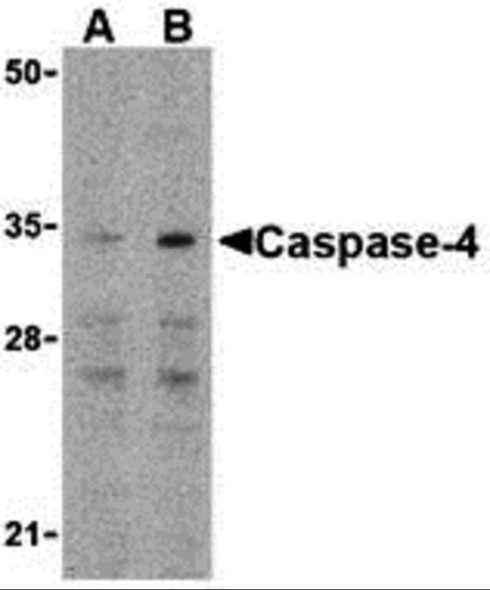Description
Caspase-3 Antibody | 3445 | ProSci
Host: Rabbit
Reactivity: Human
Homology: Predicted species reactivity based on immunogen sequence: Pig: (100%) , Rabbit: (100%) , Rat: (100%) , Mouse: (87%) , Bovine: (92%)
Immunogen: Caspase-3 antibody was raised against a 17 amino acid synthetic peptide near the center of human Caspase-3.
The immunogen is located within amino acids 70 - 120 of Caspase-3.
Research Area: Apoptosis
Tested Application: E, IHC-P
Application: Caspase-3 antibody can be used for detection of Caspase-3 by immunohistochemistry at 5 μg/mL.
Antibody validated: Immunohistochemistry in human samples. All other applications and species not yet tested.
Specificiy: At least two isoforms of Caspase-3 are known to exist.
Positive Control 1: N/A
Positive Control 2: N/A
Positive Control 3: N/A
Positive Control 4: N/A
Positive Control 5: N/A
Positive Control 6: N/A
Molecular Weight: 30 kDa
Validation: N/A
Isoform: N/A
Purification: Caspase-3 Antibody is affinity chromatography purified via peptide column.
Clonality: Polyclonal
Clone: N/A
Isotype: IgG
Conjugate: Unconjugated
Physical State: Liquid
Buffer: Caspase-3 Antibody is supplied in PBS containing 0.02% sodium azide.
Concentration: 1 mg/mL
Storage Condition: Caspase-3 antibody can be stored at 4˚C for three months and -20˚C, stable for up to one year. As with all antibodies care should be taken to avoid repeated freeze thaw cycles. Antibodies should not be exposed to prolonged high temperatures.
Alternate Name: Caspase-3 Antibody: CPP32, SCA-1, CPP32B, CPP32, Caspase-3, Apopain, CASP-3
User Note: Optimal dilutions for each application to be determined by the researcher.
BACKGROUND: Caspase-3 Antibody: Caspases are a family of cysteine proteases that can be divided into the apoptotic and inflammatory caspase subfamilies. Unlike the apoptotic caspases, members of the inflammatory subfamily are generally not involved in cell death but are associated with the immune response to microbial pathogens. The apoptotic subfamily can be further divided into initiator caspases, which are activated in response to death signals, and executioner caspases, which are activated by the initiator caspases and are responsible for cleavage of cellular substrates that ultimately lead to cell death. Caspase-3 is synthesized as an inactive proenzyme that undergoes proteolytic cleavage by caspases 8, 9 and 10 to produce 2 subunits, termed p20 and p11. These subunits dimerize to form the active enzyme. Caspase-3 proteolytically cleaves and activates other proteins such as caspases 6, 7 and 9.
Additional Information
Clonality: |
Polyclonal |
Tested Applications: |
E, IHC-P |
Host Species: |
Rabbit |
Species Reactivity: |
Human |
Conjugate: |
Unconjugated |



















